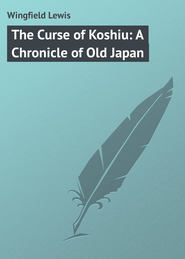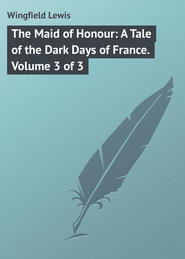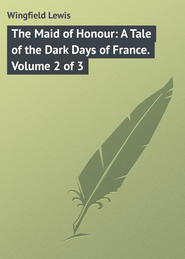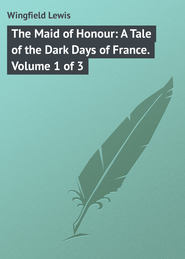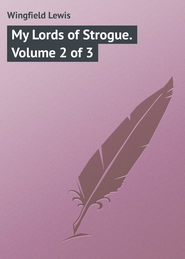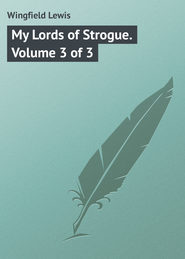По всем вопросам обращайтесь на: info@litportal.ru
(©) 2003-2024.
✖
My Lords of Strogue. Volume 1 of 3
Настройки чтения
Размер шрифта
Высота строк
Поля
'What! harping on the old string, Theobald? Still pining for a military frock and helmet? Boy, boy! Look at the pageant that is spread before our eyes. The triumph of this day is due to its bloodlessness. This grand array would not disgrace its cloth, I'm sure, in the battle; but happily success has been achieved by moral force alone. Right is might with the Volunteers. May their swords never leave their scabbards!'
'You cannot deny,' persisted the froward youth, 'that yonder battalions would be a grander sight if they really represented the nation without regard to creed-if, for example, every other man among them was a Catholic!'
My lord looked cross, my lady black as thunder, so Wolfe, the peacemaker, struck in again as he twisted his fingers in his little daughter's curls.
'I agree that it is monstrous,' he said, with hesitation, 'that three million men with souls should be plough-horses for conscience' sake. In these days it's a scandal. Sister, you must admit that. Perhaps we are entering on a better time. A reformed parliament, if you can get it, will no doubt emancipate the Catholics. You are a hare-brained lad, my godson; but here is a Catholic little girl who shall thank you. Doreen, my treasure, you may shake hands with Theobald.'
My lord waxed peevish, and drummed his fingers on the shutters and yawned in the face of Curran, for he sniffed in the wind a quarrel which would bore him. If folks would only refrain, he thought, from gabbling about these Catholics, what a comfort it would be. My lady, usually disagreeable, was threatening a scene; for they had got on the one subject which set all the family agog. Her spouse wished heartily that she would retire to the family vault, or be less ill-tempered; for what can be more odious than a snappish better-half?
Religious differences had set the country by the ears ever since the Reformation, turning father against son, kinsman against kinsman; and this especial family was no exception to the rule. Lady Glandore hated the Papists with all the energy of one whose soul is filled with gall, and who lacks a fitting outlet for its bitterness. What must then have been her feelings when, ten years before the opening of this chronicle, her only brother, whom she loved, thought fit to wed a Catholic? It was a weak, faded chit of a thing who lived for a year after her marriage in terror of my lady, gave birth to a daughter and then died. The countess, who had endured her existence under protest, was glad at least that she was well behaved enough to die; some people said indeed that she had frightened Arthur's submissive wife into her untimely grave. Be this as it may, the incubus removed, my lady girded up her loins for the effacing of the blot on the escutcheon. The puling slut was gone-that was a mercy. Why had she not proved barren? There was still a way of setting matters straight. Little Doreen must be washed clean from Papist mummeries, and received into the bosom of THE Church, and the world would forget in course of time how the young lawyer, usually as soft as wax, had flown in the face of his belongings. To her horror and amazement Arthur for once proved adamant-he who had always given way rather than break a lance in the lists-sternly commanding his sister to hold her tongue. His Papist wife, whom he regretted sorely, had exacted a promise on her deathbed that Doreen should be brought up in her mother's faith, and a Papist Doreen should be, he swore, at least till she arrived at an age to settle the question for herself. He would be glad though, he continued, seeing with pain how shocked my lady looked, if in her sisterly affection she would lay prejudice aside and help to rear the child; for the sharpest of men, as all the world knows, is no better than a fool in dealing with babies. And so it befell that the Countess of Glandore, the haughty chatelaine who scoffed at 'mummeries' and worshipped King William as champion of the Faith, nourished a scorpion in her bosom for Arthur's sake, and permitted the little scarlet lady to consort with her own lads. My lady's hatred of the national creed had a more bitter cause even than class prejudice. She had a private and absorbing reason for it, more feminine than theological. That reason was-a woman, and a rival-a certain Madam Gillin, widow of a small shopkeeper, with whom the rakish earl chose to be too familiar. Vainly she had swallowed her pride to the extent of begging him to respect his wife in public. He had called her names, bidding her mind her distaff; then had carried in mischief the story to his love, who set herself straightway to be revenged upon my lady.
'The stuck-up bit of buckram's a half-caste at the best!' she had exclaimed. 'She forgets that a Cromwellian trooper was her ancestor, whilst I can trace my lineage from a race of kings. The blood of Ollam Fodlah's in my veins. My forefathers were reigning princes before Anno Domini was thought of, and received baptism at the hands of St. Columba before Erin was a land of bondage. It is seldom that one of my faith can bring sorrow on one of hers; and, please the pigs, I'll not miss my opportunity.'
And indeed Madam Gillin showed all a woman's ingenuity in torturing another. She dragged my lord, who was nothing loth, at her kirtle strings, all through Dublin; paraded him everywhere as her own chattel; kept him dangling by her side at ridottos and masquerades, till my lady, whose mainspring was pride, dared not to show her face at Smock Alley or Fishamble Street, or even on the public drive of Stephen's Green, for fear of being insulted by this Popish hussy. She strove to find comfort in her family, as many an outraged woman does, but that was worse than all; for she looked with groaning on her eldest born, whom his father could not endure, then at that rosy, chubby younger one, and loathed him. Truly the life of the Countess of Glandore was as bran in the mouth to her, despite the wealth of my lord, his great position, and his influence. No wonder if there was an expression of settled weariness about those handsome eyes and peevish lines about her jaded mouth.
My lord drummed his white fingers impatiently-the dry-skinned fingers that mark the libertine-because of all things he hated being bored, and knew that religious discussions would bring reproaches anent Gillin. It was with relief that he beheld a gay coach half-filled with flowers, swaying in the crowd below, which contained the graces en titre of Dublin, Darkey Kelly, Peg Plunkett, and Maria Llewellyn-over-painted, over-feathered, over-dressed, like a parterre of full-blown peonies. Their apparition caused a diversion at the windows. All the peeresses stared stonily through gold-rimmed glasses as the trio passed with the calm impertinence of high-born fine ladies, for it stirreth the curiosity of the most blasée Ariadne to mark what manner of female it is who hath robbed her of her Theseus. My lord roared with laughter to see the sorry fashion in which the houris bore the ordeal, vowing 'fore Gad that he must go help them with his countenance; for there is naught so discomfiting to a fair one who is frail as a public display of contempt from one who is not. Out he sallied, therefore, drawing his sword as a hint for the scum to clear a passage; but, ere he could reach the Graces, they were borne away by the stream, and their coach had made way for a noddy, in which sat a comely woman, with bright mouse-like eyes, and a complexion of milk and roses. When the newcomer observed my lord buffeting in her direction, her lips parted in a gratified smile, and she cast a glance of triumph at the club-house; for she knew that at a window there a certain high nose might be discerned, which set her teeth on edge-set in a white scornful face, whose aspect made her blood to boil.
'That woman again!' my lady was heard to murmur, as she abruptly quitted her place. 'The globe's not large enough for her and me. I hate the baggage!'
Mr. Curran, who, if untidy and unkempt, was a man of the world and shrewd withal, tried a little joke by way of clearing the sulphur from the atmosphere; but it fell quite flat, and he looked round with a wistful air of apology as a dog does that has wagged his tail inopportunely.
'Let's be off, Theobald, 'he suggested. 'Whatever can the Volunteers be doing? Why does their return procession tarry? They should be here by this, for 'tis past three. Ah, here's Fitzgibbon, the high and mighty Lucifer, who'd wipe his shoes upon us if he dared. Maybe he brings us news.'
Instinctively everybody made way for Fitzgibbon, the brilliant statesman who already swept all before him. Even his enemies admitted his ability, whilst deploring his flagrant errors. In his fitful nature good and evil were ever struggling for the mastery. Was he destined to achieve perennial fame, or doomed to eternal obloquy? Liberal, hospitable, munificent, he was; but unscrupulous to boot, and arrogant and domineering. A man who must become a prodigious success, or an awful ruin. For him was no middle path. Which was it to be? Opinion was divided; but as at present his star was in the ascendant, his foes were outnumbered by his friends.
This man who aspired to be chancellor, and as such to direct the Privy Council, was dark, of middle height, with a sharp hatchet face and oblique cast of eye. No one could be pleasanter or more flashy than Fitzgibbon if he chose, for he united the manners of a grand seigneur with some culture, and could keep his temper under admirable control. But he preferred always to browbeat rather than conciliate, though he was a master of diplomacy, if such became worth his while. On the present occasion he strode hastily into the room as though Daly's was his private property, and, with a polished obeisance to the peeresses, flourished a perfumed kerchief.
'It's all over for the present,' he cried, with a harsh chuckle. 'The fatuous fools have postponed their grand coup till to-morrow, not perceiving that dissension is already at work among them. Oh, these Irish! They are only fit to burrow in holes and dig roots out of the earth. There is no keeping them in unison for two consecutive minutes. The sooner England swallows them the better, the silly donkeys!'
'I believe your honour is an Irishman?' asked Curran, dryly.
'Bedlamites, one and all, who crave for the impossible. I've no patience with them.' Here Mr. Fitzgibbon helped himself to a pinch from my lady's snuffbox.
'Bedad, ye're right,' sneered Curran. 'We're absurd to pretend to a heart and ventricles all to ourselves. We should be grateful-mere Irish-to be by favour the Great Toe of an empire!'
'England has always betrayed us!' cried out young Tone, the neophyte. 'Knowing we're hungry, she throws poisoned bones to us. The only way to set right our parliament will be to break with England altogether!'
The bold sentiment set all the peeresses tittering. They cackled of freedom, and were bedizened in smart uniforms; yet were there few of these noble ladies whose hearts were really with the new crusade. It was vastly diverting to hear this David attacking the great Goliath. They settled their skirts to see fair play; but Fitzgibbon for once was ungallant.
'Your godson, isn't it, Wolfe?' he remarked carelessly. 'Send for the child's nurse that he may be put to bed.'
He could not sweep Curran aside in this magnificent fashion, so he elected to be unaware of his presence. He disliked the little advocate because he feared him. Yes, the would-be aristocrat was mortally afraid of the plebeian-a privilege which he accorded to few men on earth. The two had risen at the Bar side by side, till the influence which Fitzgibbon could command gave him an advantage which his undoubted talent enabled him to keep. With sure and steady progress he forced himself above his fellows, and won the adulation which accompanies success. It was his crumpled roseleaf that Curran should be keen enough to gauge his real value; that he should despise him as a mountebank, that he should read within his heart that personal ambition was his motive-spring, not love of country. As it happened, Curran was a master of invective, and no niggard of his shafts; so Fitzgibbon tried flattery, and got jeered at for his pains, which produced a hurricane of sarcasm. It was with rage that he accepted at last a fact. If there was one person who could stop his soaring Pegasus in full career, that man was common-looking Curran. So the arrogant candidate for honours marked out his enemy as one who must be watched, and if possible circumvented; and the more he watched the more he detested that odious little creature.
He did not choose therefore to take umbrage at his taunts; but, mindful of the adage that to be anhungered is to be cross, announced that a collation awaited the pleasure of their ladyships. Now patriotism is one thing, and fine clothes another; but there are times when cold beef will bear the palm from either. So was it on this occasion. The peeresses rose up with unromantic unanimity at the mere mention of cold beef, seizing each the arm of the nearest gentleman; and so Curran and his young friend, being unable to escape, found themselves standing presently before a well-furnished board, hemmed in on either side by a lady of high rank.
The showy Fitzgibbon was master of the situation, for Curran was not a lady's man, and the neophyte in such noble company was sheepish. His harsh voice rose unchallenged in polished periods as he explained between two mouthfuls the mess the Volunteers were making. Curran smiled at his imprudence; for was he not flinging dirt at the popular idol-that glittering national army which had worked such miracles; whose many-coloured uniforms sparkled in every street, on the very backs of the dainty dames who looked up at him surprised?
'No good will come of it,' cried the contemptuous great man, as he waved a silver tankard. 'They are acting illegally; are pausing before they dare to overthrow constitutional authority, as the regicides did before they chopped off Charles's head. A little ham, my lady? No? Do, to please me. Will you, my dear Curran? Just a little skelp? Pray do, for you look as if you'd eat me raw; and that young man too. I vow he is a cannibal. What was I saying? He who vilifies those who are in power is sure of an audience, you know. Positively, this regeneration scheme is laughable, quite laughable!'
'Stop your friend,' said some one to Curran, 'or there'll be swords drawn before the ladies;' to which the other answered, 'Friend! No friend of mine, or indeed of any one except himself, the maniac incendiary! Ask Arthur Wolfe. Perhaps he will interfere.'
But Fitzgibbon was not acting without a purpose. He ate his ham with studied nonchalance, shaking back his ruffles with unrivalled grace; and he at least was sorry when an unexpected circumstance occurred which withdrew the attention of his audience from himself and his insidious talk.
There was a mighty noise without which shook the windows. The undergraduates, hearing that the battle was postponed, poured forth from their gallery in the Commons with the fury of a pent-up river suddenly let loose. They had wasted their time and energies. Their lithe young limbs were cramped. Something must be done to set the blood dancing through their veins again. What did they behold as they dashed out into the street? Peg Plunkett and her companions flirting with soldiers-not Volunteers, but actually English soldiers, members of the Viceroy's bodyguard. It must never be said that Irish Phrynes gave their favours to English soldiers-at such a time too! Fie on them for graceless harlots! Their feathers should be plucked out-they should be ducked-the English Lotharios should be well drubbed-driven back to the Castle with contumely and bloody noses. Hurrah! Pack a stone in the sleeve and have at them, the spalpeens! It was well for the Viceroy that he went home when he did, without strutting, as he proposed to do, once more round Juggernaut; or he would certainly have been assaulted by the mischievous collegians, and a serious riot would have been the consequence. But Darkey Kelly and Maria Llewellyn! Pooh! it served them right, and no one pitied them. At all events, the peeresses (mothers of the lads) said so, as they leisurely returned to the discussion of cold beef and politics. They were too well broken to street brawls to care much about a stampede of college youths. But that Fitzgibbon should presume to attack the national army was too bad, and touched them home. None of them dared admit that English gold was more precious than national freedom. There are secrets that for very shame we would go any lengths rather than divulge. These ladies made believe to be terribly shocked-threatened to assail the adventurous wight like bewitching Amazons; but he knew them too well to be alarmed. If Curran could read him, he could read the peeresses; and neither subject was an edifying one for investigation.
CHAPTER II.
RETROSPECT
The brief career of the Volunteer army stands as a unique example for students of history to marvel at. Urged by a strange series of events, Ireland, like Cinderella, rose up from her dustheap, and was clad by a fairy in gorgeous garments. All at once she flung aside her mop, and demanded to be raised from the three-legged stool in the scullery to the daïs whereon her wicked sister sat. And the wicked sister, being at the time sorely put about through her own misconduct, embraced her drudge with effusion on each cheek, instead of belabouring her with a broom, as had been her pleasant way, vowing that the straw pallet and short commons of a lifetime were all a mistake, and that nought but samite and diamonds of the first water were good enough for the sweet girl. She killed the fatted calf, and drew a fine robe out of lavender, and grinned as many a spiteful woman will whom rage is consuming inwardly, registering at the same time a secret oath to drub the saucy minx when occasion should serve-a not uncommon practice among ladies.
Events followed one another in this wise. France, natural enemy of England, had suffered sore tribulation at the hands of my Lord Chatham, who routed her armies and sunk her ships, and filled his prisons with the flower of her youth. But my Lord Chatham's mighty spirit succumbed to chronic gout; an incompetent minister took his place, whose folly lashed the young colonies of America to rebellion, and France saw with joy such a blow struck across the face of her too prosperous rival as brought her reeling to her knees. This was the moment for reprisals. France breathed again. Quick! she said, a deft scheme of revenge! How shall we find out the weakest point? We will invade Ireland which is defenceless, and so establish a raw in the very flank of our enemy. But Ireland had no idea of tamely submitting to a hostile French occupation. Unhappily for her, she was never completely conquered, and was ever over-fond of nourishing wild hopes of independence-of formal recognition as a nation among nations. To become a slave to France would be no improvement upon her present slavery, and she had already been a subject of conflict for centuries. She cried out therefore to the wicked sister, 'Save me from invasion. Send me men to garrison my fortresses; ships to protect my harbours.' But England turned a deaf ear, being herself in a dire strait; bandaging her own limbs, nursing her own wounds. 'Then,' said Cinderella, 'give me arms at least. I come of a good fighting stock, and will even make shift in the emergency to defend myself.' Here were the horns of a dilemma. Unarmed and undefended, Ireland would of a surety fall an easy prey to France, which would be a serious mishap indeed. On the other hand, deliberately to place a weapon in the grasp of a young sister whom we have wronged and hectored all her life, and who ominously reminds us that though slavery has curbed her spirit she comes of a good fighting stock, is surely rash. Forgiveness of injuries savours too much of heaven for mere daughters of earth, and it is more than probable that, having repulsed the invader, this child of warlike sires will seize the opportunity to smite us under our own fifth rib. However, there was nothing for it but to risk that danger; so England sent over with a good grace a quantity of arms, and secretly vowed to whip the naughty jade on a later day for having been the innocent cause of the difficulty.
That which Britain feared took place. For six hundred years she had persistently been sowing dragons' teeth in the Isle of Saints, and perseveringly watering them with blood; and lo, in a night, they rose up armed men-a threatening host of warriors, who with one voice demanded their just rights, unjustly withheld so long. England bit her lips, and parleyed. She felt herself the laughingstock of Europe, and her humiliation was rendered doubly acute by the dignified bearing of the new-born battalions. They did not bully; they did not revile. They calmly claimed their own, with the least little click of a well-polished firelock, the slightest flutter of a green silk banner. 'To suit your own selfish ends,' they declared, 'you have robbed us of our trade and suborned our legislature. Give us back our trade; permit us to reform our senate. You have stripped us of our commerce piecemeal. Return it, to the last shred. In the days of the first Tudor, when you were strong and we were weak, a decree of Sir E. Poyning's became law, whereby we were to be ruled henceforth from distant London. The operation of all English statutes was to extend to Ireland; the previous consent of an English Council was necessary to render legal acts passed at home. By the 6th of George III. this was made absolute; the Irish senate was decreed to be a chapel of ease to that of Westminster. When we were weak our gyves were riveted tightly upon our legs. Now our conditions are reversed; yet claim we nothing but our own. Bring forth the anvil and the hammer. Strike off with your own hand these fetters, for we will wear no bonds but those of equal fellowship. Give us a free constitution and free trade, and let bygones be bygones.'
Attentive Europe admired the position of Ireland at this moment. A change was creeping across the world of which this situation was a natural result. A cloud, like a man's hand, had arisen on the horizon of America, which in time was to overshadow the globe. A warlike fever possessed the Irish people. They became imbued with an all-engrossing fervour, an epidemic of patriotism. The important question was, could they keep it up? Irish veterans, who had fought under Washington, returned home invalided, to thrill their audience by the peat fire with tales that sounded like fairy lore of Liberty and Fraternity and Freedom of Conscience; to whisper that their country was a nation, not a shire; that an end must be put to bigotry, that accursed twin-sister of religion; that if the King of England wished to rule the Isle of Saints, he must do so henceforth by right of his Irish, not his English, crown, governing each kingdom by distinct laws according to its case.
High and low were stricken with the new enthusiasm; some generously, some driven by shame to assume a virtue which they had not. Laird, squire, and shopkeeper-all donned the Volunteer uniform. All looked, or affected to look, to the eagle of America as a symbol of a new hope. A race of serfs were transformed into a nation of soldiers. Many really thought themselves sincere who fell away when their own interests became involved.
And this sudden upheaving was at first without danger to the body politic. The French Revolution, with its overturning of social grades, had yet to come. Classes found themselves for a brief space thrown together, between whom usually a great gulf was fixed, and the temporary commingling was, by giving a new direction to the mind, for the mutual benefit of both. The very singularity of such a state of things (in an age before democratic principles began to obtain) showed a seriousness of purpose which caused the ruling spirits of the new military association to carry all before them by the impetus of self-respect. Their mother had suffered bitterly and long; no one denied that. The time was come for her rescue. The task was arduous, but the cause was excellent. It behoved her sons then to raise their minds above the trammels of the earth-to become Sir Galahads-for was not their task to the full as pious as the mystic quest after the Grail? It behoved them, while the holy fervour lasted (alas! man is unstable at the best, and the Irishman more so than most), to set their house thoroughly in order, and the powerless English Cabinet from across the Channel watched the operation with anxiety.
When a wedge is inserted in so unnatural a bundle as this was, it will speedily fall asunder, and that which was a formidable coalition will be reduced to a ridiculous wreck. Who was to insert the wedge? Would time alone do it, or would perfidious aid from London be required? That it should be inserted somehow, was decided nem. con. in London.
Alas! in the moment of supreme triumph, whilst the Volunteers caracole so bravely down Sackville Street, we may detect grave symptoms of danger, which argus-eyed England scans with hope, while the Viceroy is laughing in the Castle.
Ireland had during ages been the butt of fortune. A train of English kings had entreated her evilly, and the native bards reviewed the sad story with untiring zeal.
First they sang of Norman thieves-turbulent barons who, troublesome at home, were despatched to get rid of superfluous energy at the expense of Keltic princes. They slurred over the reign of the first Edward, for with him came a deceptive ray of hope. He threatened to visit the island in person. Had he done so, he would have quelled the Irish thoroughly, as he did the Welsh, and so have nipped their delusive dream of freedom in the bud. The most aristocratic race in the world would have become loyal, for they would have seen the face of their lord, and the face of royalty is as a sun unto them. But they did not become loyal, for they saw their lord's face as little then as they see that of their lady now. Nor he, nor any of the brave Plantagenets ever came to Ireland, for they were pursuing an ignis fatuus in France, instead of attending to their own business at home. Henry V. and Edward III. sought fame, which might not be obtained, they thought, by obscure squabbling with saffron-mantled savages in a barbarous dependency.
Events shuffled along in slipshod, careless fashion, till the period when crook-backed Richard met his end at Bosworth. By that time a mixed population held undisputed possession of the island-a bastard race, half Keltic, half Norman. The 'English of the Pale,' or early settlers, had found Irish brides. They wore the saffron mantle and spoke the Keltish tongue. But the first Tudor, who had no sympathy with savages, declared 'this might not be.' He had a spite against them which he was but too glad to gratify, for in the absence of a king they had crowned an ape-or rather an impostor, Simnel. In virtuous indignation, he vowed that it was revolting to see noble knights reduced to the serfs' level; to which the chiefs replied with one accord:
'We are no serfs, but freemen, as ye are yourselves; for Ireland was never conquered, though she did lip-homage.'
The Tudor did not choose to be so bearded. 'Indeed! You were not conquered?' he said, surprised. 'I will send commissioners who shall straightway solve for me this riddle.' And he sent Sir Edward Poynings, who arrived in state, with special instructions to set the chiefs a-quarrelling.
The guileless princes received the commissioner cordially, who diligently sowed dissensions, setting race against race, by declaring (in 1494) that none of English blood might wed a Keltic wife, or hold communion with the Irishry, or even learn their tongue. O'Neil was pitted against Geraldine, Desmond against Tyrone, with double-faced advice; and, his dastardly commission done, Sir Edward bowed himself away with smiles, leaving behind the celebrated act which bears his name, and which was as a red rag between the nations ever after, till it was taken in hand by the Volunteers.
Up to this moment the frequent bickerings which disturbed the fellowship of the two islands were concerning land or race; but with the reign of the eighth Henry, the true demon of discord woke to wave the sword of persecution over the distracted country. The Reformation, which brought so much trouble on the world, was no kinder to the Irish than to other nations. Henry, angry with a people who would not do as they were bid, drove the natives from the holdings which their septs had held for centuries, away to the wild fastness beyond the Shannon. (A sinful scheme, which is often fathered upon Cromwell, who has much besides to answer for.) He ravaged the land with fire and sword, resolved at least that it should have the peace of death if none other was attainable; and these tactics his dutiful child Elizabeth pursued, till her dependency was a waste of blood and ashes. Like her grandfather, she had a private cause for spite. As a nation, the Irish declined to be anything but Catholics; and so, refusing to acknowledge Queen Katherine's divorce, they looked on Anne Boleyn's daughter as a bastard and a usurper. This prompted her to filial piety. Hardly was she seated on the throne at Westminster, than she summoned a parliament in Dublin, and shook her pet prayer-book at the Catholics. The religion of Christ, the meek and lowly, she preached to them in this wise. Every layman who should use any prayer-book but her pet one was to be imprisoned for a year. On each recurring Sunday, every adult of every persuasion was to attend Protestant service, or be heavily mulcted for the benefit of her treasury. Not content with crushing their faith, she let loose a horde of adventurers upon the unhappy Irish. They fought for their fields as well as their religion. One of the characteristics of her reign was a spirit of adventure, which descended in regular gamut from the loftiest heroism to the vilest cupidity. The eagles sought doubloons on the Spanish main; the vultures swept down on Ireland with ravenous beaks. Elizabeth's own deputy wrote thus to her in horror:
'From every corner of the woods did the people come, creeping on their hands, for their legs would not bear them. They looked like anatomies of death; they spake like ghosts; they did eat carrion, happy when they could find them, yea, and one another; in so much that the very carcases they spared not to scrape out of their graves.'
Indeed, Queen Bess left her dependency a reeking slaughter-house, in so abject a misery, that when her successor cleared a whole province to plant it with Scotchmen, the natives made no resistance, but plodded listlessly away. Is it surprising that their descendants should have hated England, and its truckling Anglo-Irish Senate?
In due course followed Charles I., who, with the ingrained perfidy of all the Stuarts, fleeced his Irish subjects, and then cheated them by evading the graces for which they paid their gold. His creature Strafford went too far, and they turned as worms will. There was a grand Protestant massacre in Ulster, an appalling picture of a vengeance such as a brutalised people will wreak on its oppressor; and Cromwell took advantage of this as an excuse for still further grinding down the Catholics. It was a fine opportunity to avenge the sufferings of Protestants in other lands-the affair of Nantes, Bartholomew, and so forth. He made a finished job of it, as he did of most things to which he set his shoulder. It was no felony now to slay an Irishman, whose very name was a reproach. He was well-nigh swept from off the earth. Famine and pestilence reigned together alone. Wolves roamed at will in the dismantled towns. Newly-appointed colonists refused to build the walls of shattered cities, for the stench of the rotting bodies poisoned the breeze.
It remained for Orange William and good Queen Anne (neither of whom could be expected to feel interest in Ireland) to add a finishing touch, and the Penal Code was a chef d'œuvre. Under its sweet influence no Catholic could dwell in Ireland save under such conditions as no man who stood erect might bear, and so there commenced an exodus of independent spirits, who flocked into the service of France and Germany, and filled the navies of Holland and of Spain. Thus did British rulers educate their dependency to loving obedience, by teaching its children to revile the name of law. Verily it is no wonder that they loathed the English; that they distrusted British amenities, and looked askance at the half-English upper class.
When the Volunteers determined to regenerate their motherland, there were two great evils with which they had to cope. Two deep plague-spots. It remained to be seen whether they were wise enough and steadfast enough to eradicate the virus. A rotten legislature, an impossible Penal Code. Could Sir Galahad reform so base a parliament? Would the champion dare to free the serfs from thraldom? The first was a Herculean labour, because both Lords and Commons drew much of their revenue from British ministers; the second was even a more Titanic task. Possession is nine points of the law, and the soil was in possession of the small knot of Protestants, who knew that their existence depended on keeping the majority in chains. Like the emigrants of the Mayflower, they said: 'Resolved, that the earth is the Lord's, and the fulness thereof; that the Lord hath given the earth as an heritage unto His saints; and that we are His saints. Ergo: the earth is ours, to have and to hold by pillage and persecution, and murder, if need be, just as the chosen people of old seized and held Canaan, the land of promise, flowing with milk and honey.'






